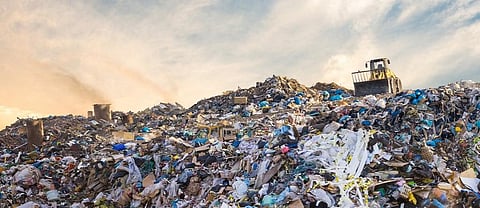

South Africa’s Department of Environmental Affairs (DEA) on August 23, 2019, imposed a ban on all forms of liquid waste from being dumped at landfill sites, six years after it was first announced.
The ban means nearly one million tonnes of liquid waste produced in South Africa annually will now have to be transported to a different waste management facility.
“The prohibitions and restrictions are intended to achieve environmental protection, safe landfill operation and waste diversion from landfill (waste hierarchy) as stipulated in the Waste Act,” Zama Mtembu from DEA’s hazardous waste management division, told Down To Earth, in an email.
According to previous regulations, hazardous liquid waste with calorific values of more than 20 megajoules per kilogram (MJ/kg) such as refinery waste, chemical processed paint waste, hydrocarbon contaminated liquids, sludges and chemical solvents were barred from being disposed in landfills.
The current ban, however, includes reactive wastes, recyclable waste oils, whole waste tyres, lamps, lead acid batteries, besides any waste with a calorific value of more than 20 MJ/kg.
Importantly, the ban will ensure that groundwater reserves in the country are protected from toxic leachate, which seeps hazardous liquids through landfills. Waste disposal facilities will now have to ensure that the volume of liquid waste brought to their disposal sites must contain less than 40 per cent moisture to curb leachate.
“Leachate treatment plant were not performing according to standards and therefore creating liquid accumulation in leachate dams, and then overflows in the rainy season. The Department had to intervene,” Mtembu said.
The law to ban liquid waste from landfill disposal was first tabled in the South African Parliament in 2013.
The six-year gap has been “a transitional timeframe. It was done to allow waste generators to seek alternative solutions to manage the waste,” Mtembu said.
The waste management industries have, meanwhile, shown a mixed response to the new regulation.
According to Mtembu, the industry response has not been good so far. But as the restriction rolls out, the picture would be clearer, he said.
The ban demands alternative and more sustainable waste management methods that would develop an efficient waste economy in South Africa, Interwaste business development and marketing director Kate Stubbs, said while speaking to the media.
She added that the ban would open up space for newer innovation in waste production.
Interwaste business, for example, has over the years developed recycling or recovery of qualifying wastes at its licensed waste management facilities through the recycling of qualifying liquid and hazardous sludge wastes.
The hazardous liquid wastes can also be used as an alternative fuel for energy production, which can cut dependence on fossil fuels and boost the country’s economy.